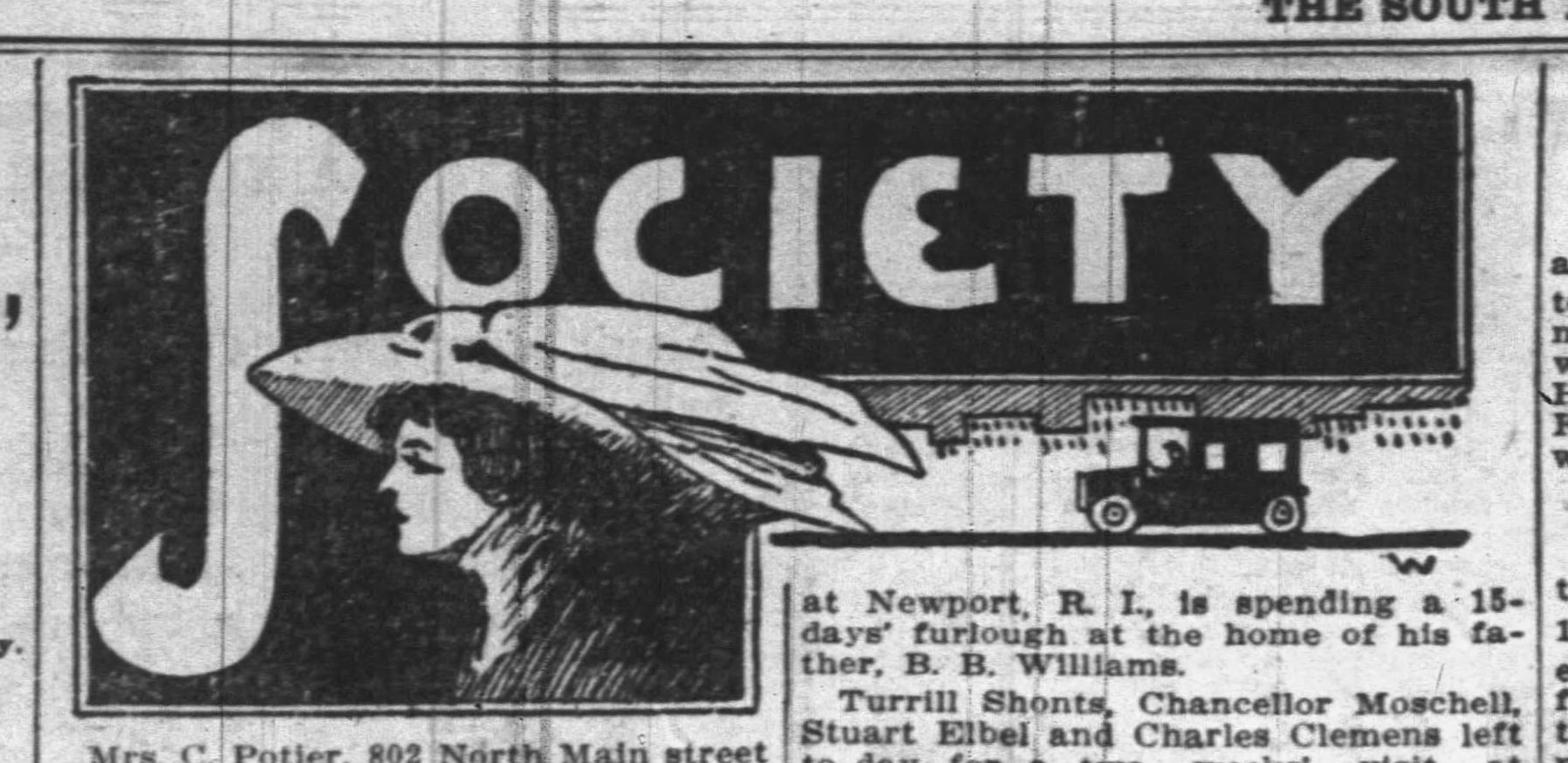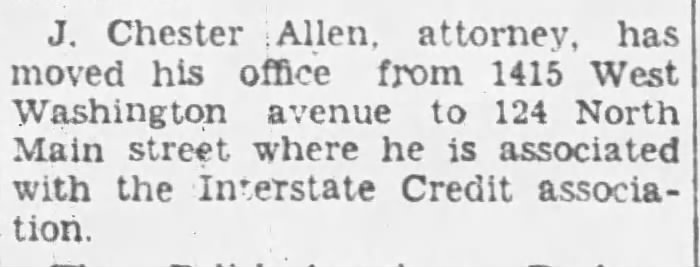West Side Recreation Club, 1415 West Washington
A center of local black political and social power for decades beginning in 1929 was also a frequent target of local police.
In 1912, Samuel Gutstein purchased the empty plot of land, at the corner of Washington and Birdsell Streets. He built a dry goods store that sold items such as clothing, personal hygiene products, and non-perishable staples like flour and coffee. The building also served as the Gutsteins’ home and a place where he and his family entertained guests.

The South Bend Tribune, August 8, 1910
In January 1929, the former dry goods store was replaced with a pool hall and rooms for rent. Now called the “West Washington Recreation Club,” a central figure at the new facility was Henry Nelson Hill. Born in Niles, Michigan in 1877, “Hank” Hill (as he was sometimes referred to) had a history both as a community leader and as a target of police. For example, in July 1919, Mr. Hill was elected to serve on the board of the local chapter of the fraternal organization, the Knights of Pythias.[1] However, four months later, he was one of nineteen people arrested for gambling during a raid on a soda shop.[2] This was one of many times either Henry Hill or the West Side Recreation Club would be targeted under the pretense of stopping illegal gambling.[3]
With spaces to rent as apartments and offices, many new Black professionals took advantage of the Club to establish themselves. J. Chester Allen, local lawyer, politician, and activist whose later efforts helped desegregate the Engman Public Natatorium, had an office there until he moved to downtown South Bend in 1931.[4] Two of the first Black doctors in South Bend had offices there as well—Dr. C. A. Mott, and a dentist, Dr. Bernard Streets. Dr. Streets opened his first office there in 1929, shortly after earning his doctorate from Indiana University’s dental school. Later, he too would join the effort to desegregate spaces like the Natatorium. Zilford Carter, attorney and another advocate for desegregating the Natatorium, rented an office at the Club as well.


The South Bend Tribune, August 27, 1929, November 25, 1931.
By providing space for some of South Bend’s Black elite professionals, the Club became a frequent location to meet and socialize. The South Bend Tribune’s “In Colored Circles” Black society page regaled readers with stories from the Club’s many events, such as dinners with a dozen or more guests, as well as meetings of some of the many social clubs of the time including the Robert Johnson post of the American Legion, the Friendship Club of Olivet A.M.E. Church, and the Fraternal Building Association of South Bend. A mayoral candidate, Judge Chester L. DuComb, visited to drum up African American support in his bid to be the Republican nominee in the fall 1929 local election.[5]
Sadly, in April 1934, Henry Hill was murdered at his pool hall. In a demonstration of the lack of value placed on Black life, very little was written about the murder—and what was written was dehumanizing and even dangerous. In a particularly calloused article entitled, “Detective Hunts Trousers Two Years; Walk In On Him,” South Bend Police Detective Lucius LaFortune was questioning someone in connection with Mr. Hill’s murder when he noticed the pants the gentleman was wearing looked familiar. Detective LaFortune recognized the pants as his own, stolen from his home two years earlier. The article breezes through Hill’s murder, identifying him as a “Negro gambler,” and allocating significantly more words to the returned pair of pants than Mr. Hill’s death.[6] The Tribune’s rival paper, the South Bend News-Times, invoked a popular, though dangerously racist trope by speculating that Hill’s murderer was motivated by his being “associated with a number of white women.” [7]
After Hank Hill’s death, new building owners continued to operate the site as a pool hall with gambling activities while also renting out apartments and office space. Over the next several decades, the pages of the Tribune volleyed back and forth between news of pleasant social gatherings and raids by police.
This changed on January 14, 1971, when at least a dozen FBI officers raided the Club and arrested eleven men—including the Club’s owner, Wiley Hoover. Federal agents, along with three firefighters, spent five minutes with an axe, a door opener, and a crowbar to break down a quarter-inch steel-plated door used to shelter gamblers in the event of a raid.[8]
It is worth noting that those playing these gambling games often bet small amounts of money. “Playing the numbers,” or “policy numbers,” as it was called, is similar to a lottery in which people buy slips of paper with numbers on them and win a cash award if their numbers are later picked in a random drawing. Though the bets were small, because they were done frequently enough (twice a day in South Bend) and with enough people playing, those running the game—and taking the risk of arrest and fines—could expect a fairly large reward. In the mid-1970s, South Bend police estimated that $126,000 profit per year (worth approximately $600,000 in 2022) would be “a low estimate.”[9] Since this was an illegal activity, organizers were likely not keen to report these earnings to the IRS and therefore pay taxes on them.
Why was this form of small-scale gambling so frequently targeted while others—church bingo halls, raffles at community fundraisers, etc.—were not also considered illicit? In an opinion piece published in the South Bend Tribune entitled, “Why are blacks prosecuted for gambling when others are not?” Willie Green Jr. attempted to “draw attention to a system that frequently burdens the black community with a sense of guilt for daring to do what others are doing.” He posited:
If you know anything at all about the “street life” in South Bend, you know that gambling can be located on W. Washington, on Lincoln Way, on Portage, on Colfax...as well as on Chapin St. You can go into almost any bar of consequence, particularly in the middle class neighborhoods, and have easy access to [gambling]. There is some kind of gambling pool held weekly, during football season, in all of the major manufacturing companies in our area.
We in the black community continue to wonder with dismay how gambling becomes a vice subjected to the wrath of city and federal authorities when participated in by blacks. Is it that we participate in the only unacceptable forms of gambling, namely: shooting dice, playing the numbers or playing skin? Are the other forms of gambling more acceptable?[10]
At his trial, Mr. Hoover alleged in court that local police and politicians “knowingly permit [the] illegal gambling business,” though he “declined to indicate how much money or payoffs are going to these officials.”[11] Whether police or politicians profited off bribes was not formally proven.
In 1979, Wiley Hoover—who at that point had owned the West Side Recreation Club for the entirety of the decade—was sentenced to two years in federal prison and a $20,000 fine. Two others arrested with him were sentenced to one year in prison.[12]
This was the final act that ended the building’s gambling activities, and with it, much of the building’s use. Some time before 1986, the Club was abandoned. It reopened in 2005 as the West Washington Community Food Pantry, but unfortunately, that new use would not last.[13] As of 2023, the building remains vacant.
[1] “Elect South Bend People,” South Bend News-Times, July 25, 1919, 2. The Knights of Pythias was one of many fraternal organizations popular in the early 20th century, such as the Masons, Elks, Knights of Columbus, and many more.
[2] "Nineteen Caught in Elliott Place Raid,” The South Bend Tribune, November 10, 1919, 16.
[3] “Pyle Will Hear Case,” The South Bend Tribune, April 2, 1914, 12.
[4] The South Bend Tribune, November 25, 1931, 6.
[5] The South Bend Tribune, May 1, 1929, 16. Judge DuComb won the Republican nomination in May but lost the general election in November. It is worth remembering that, at this time, the Republican party was significantly more hospitable to African Americans and their votes, having been associated with Abraham Lincoln and against enslavement during the Civil War. The break away from the Republican party towards overwhelming support for the Democratic party today began in earnest during the latter half of the 20th century.
[6] “Detective Hunts Trousers Two Years; Walk In On Him,” The South Bend Tribune, April 18, 1934, 1.
[7] “Murder of Hill Still Unsolved,” South Bend News-Times, April 21, 1934, 12.
[8] “Grand Jury Will Hear Gaming Case,” The South Bend Tribune, January 15, 1971, 19.
[9] Ibid.
[10] Willie V. Green, Jr., “Why are blacks prosecuted for gambling when others are not?,” The South Bend Tribune, May 3, 1979, 15.
[11]“Report says police knew,” The South Bend Tribune, October 28, 1977, 17.
[12] Bruce A. Kohn, “Two Year Term Given Hoover,” The South Bend Tribune, February 17, 1979, 11.
[13] Joseph Dits. “Food Pantry Opens on Washington Street.” The South Bend Tribune. April 19, 2005, sec. B.

